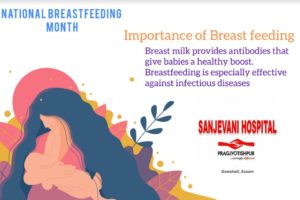Barak UpdatesHappeningsBreaking News
The importance of breast feeding, writes Dr. Amit Agarwala

September 1: The country just celebrated National and World Breastfeeding Awareness Month in August, and experts and mothers from more than 170 countries agree that Breast milk is best when it comes to feeding a baby in the first year of life. According to the American Academy of Pediatrics (AAP), exclusively breastfeeding during the first 6 months provides all the nutrition an infant needs. The AAP recommends that mothers breastfeed exclusively for about the first 6 months, followed by breastfeeding combined with gradually introducing other foods until at least 12 months of age, and continuing as long as mother and baby wish to breastfeed.
 Benefits of Breastfeeding: Most health professionals are familiar with the benefits of breastfeeding, breast feeding protects against a variety of diseases and conditions in the infant such as:
Benefits of Breastfeeding: Most health professionals are familiar with the benefits of breastfeeding, breast feeding protects against a variety of diseases and conditions in the infant such as:
- Bacteremia
- Diarrhea
- Respiratory tract infection
- Necrotizing enterocolitis
- Otitis media
- Urinary tract infection
- Late-onset sepsis in preterm infants
- Type 1 and type 2 diabetes
- Lymphoma, leukemia, and Hodgkins disease
- Childhood overweight and obesity
 There are also maternal health benefits to breastfeeding such as:
There are also maternal health benefits to breastfeeding such as:
- Decreased postpartum bleeding and more rapid uterine involution
- Decreased menstrual blood loss and increased child spacing (lactational amenorrhea)
- Earlier return to pre-pregnancy weight
- Decreased risk of breast and ovarian cancers
A few confusions associated with breastfeeding:
- How long should a mother breast feed her baby?
World Health Organisation says it should be exclusive breast feeding for the first six months of baby’s life. There is no need to give water, honey, cow milk, buffalo milk or formula. After that, along with other soft foods breast feeding can be continued upto 2 years of age.
- What advice would you give for working mothers?
Government of India strongly advocates breast feeding. The new maternity leave benefit is for 6 months. So the mother and child can stay happily bonded till then. From then on and for those working mothers who for any reason can’t avail this benefit can still give breast milk by expressing it with the help of breast pumps, storing it and giving to the baby by the caretaker . This is a very convenient method of giving mother’s milk and can be continued till the baby is two years old.

- Which milk is a good alternative for breast milk?
No, there is no alternative for mother’s milk. It is a boon given by nature that is best suited for the baby. It is far more superior to any formula, cow milk or buffalo milk. You say formula milk is not a good alternative? There are many mothers, who depend on it for baby feeds.
- What diet can be taken by the mother to improve the quantity of breast milk?
Foods that improve the breast milk are called galactogogues. Oats, Fenugreek ( methi) and garlic are good dietary galactogogues. Satavari is a herb that is also an excellent galactogogue and is added to most commercial preparations that are prescribed to the mother to increase the breast milk.
- During this corona pandemic where social distancing is to be followed can mother’s still continue breast feeding?
Yes definitely. All mother’s who are unaffected by corona should breast feed the babies in order to keep their immune system highly active. And those mothers who are suffering from corona virus infection should also give breast milk because as of today evidence says the virus hasn’t been observed in breast milk. So she should be in isolation, express out breast milk and give it to a healthy care taker to give to the baby.

Five common myths in breastfeeding in breastfeeding:
Breastfeeding is the natural method through which a mother feeds her milk to her baby, thereby providing nutrients, fluids and even antibodies against diseases. It is, therefore, an extremely healthy practice that provides a baby with the best start in life possible. The World Health Organisation (WHO) and experts around the world recommend that all mothers should exclusively breastfeed their babies for at least the first six months of their lives.
- Myth 1: It’s natural for your nipples to hurt when you breastfeed.
- Myth 2: Many mothers find it difficult to produce enough milk
- Myth 3: You can’t breastfeed if and when you’re sick.
- Myth 4: You can’t get pregnant while you’re breastfeeding.
- Myth 5: Breastfeeding will ruin the shape of your breasts.
 Breastfeeding & the role of Pediatrician:
Breastfeeding & the role of Pediatrician:
Pediatricians can play a key role in promoting breastfeeding and supporting families. You can:
- Communicate the benefits of breastfeeding and the risks of formula feeding to all of your patients.
- Educate yourself about breastfeeding and how to care for breastfeeding families in your practice.
- Know how to assess breastfeeding and manage common breastfeeding problems.
- Know the local resources available to you and your patients (WIC, breastfeeding support groups, lactation consultants, breast pump rental stations, etc.)
- Understand how to use breastfeeding equipment and be able to support women who wish to return to work or school while breastfeeding.
- Display positive images of breastfeeding in your office and encourage the elimination of practices that interfere with breastfeeding (free formula, industry gifts, or coupons to parents, separation of mother and infant, inappropriate feeding images, etc.)
- Support breastfeeding research and advocate for positive media coverage about breastfeeding.
- Advocate for positive media coverage about breastfeeding.
 Breast milk helps keep your baby healthy. It supplies all the necessary nutrients in the proper proportions. It protects against allergies, sickness, and obesity. It protects against diseases, like diabetes and cancer. Studies show breastfed babies have higher levels of cognitive function. Breast milk may even help your child in later years, by reducing the risk of being overweight, and of developing asthma, type 1 and type 2 diabetes, high cholesterol, Hodgkin’s disease, leukemia, and lymphoma. Some researchers suggest that it only appears that breastfeeding is responsible for the increase in intelligence and problem-solving skills, but that’s not the case. Instead, the reason breastfed children do better is because they are more likely to grow up in an environment that supports cognitive development. A long-term study has pointed to a link between breastfeeding and intelligence. Those who were breastfed for longer scored higher on measures of intelligence as adults.They were also more likely to earn a higher wage and to have completed more schooling.
Breast milk helps keep your baby healthy. It supplies all the necessary nutrients in the proper proportions. It protects against allergies, sickness, and obesity. It protects against diseases, like diabetes and cancer. Studies show breastfed babies have higher levels of cognitive function. Breast milk may even help your child in later years, by reducing the risk of being overweight, and of developing asthma, type 1 and type 2 diabetes, high cholesterol, Hodgkin’s disease, leukemia, and lymphoma. Some researchers suggest that it only appears that breastfeeding is responsible for the increase in intelligence and problem-solving skills, but that’s not the case. Instead, the reason breastfed children do better is because they are more likely to grow up in an environment that supports cognitive development. A long-term study has pointed to a link between breastfeeding and intelligence. Those who were breastfed for longer scored higher on measures of intelligence as adults.They were also more likely to earn a higher wage and to have completed more schooling.
 In India, as per the National Family Health Survey (NFHS)-4 (2015-16), only 41.6% children under three years were breastfed within one hour of birth while only 54.9% children were exclusively breastfed until six months. The UK remains one of the countries with the lowest breastfeeding rate in the world. And as well as, negative attitudes towards breastfeeding in public and the workplace, limited awareness about the benefits of breast feeding, as well as cuts in public health funding have all been highlighted as contributing factors.
In India, as per the National Family Health Survey (NFHS)-4 (2015-16), only 41.6% children under three years were breastfed within one hour of birth while only 54.9% children were exclusively breastfed until six months. The UK remains one of the countries with the lowest breastfeeding rate in the world. And as well as, negative attitudes towards breastfeeding in public and the workplace, limited awareness about the benefits of breast feeding, as well as cuts in public health funding have all been highlighted as contributing factors.
**Dr Amit Agarwala is the Consultant Child Specialist and Medical Director, Sanjevani Hospital, Maligaon Guwahati




